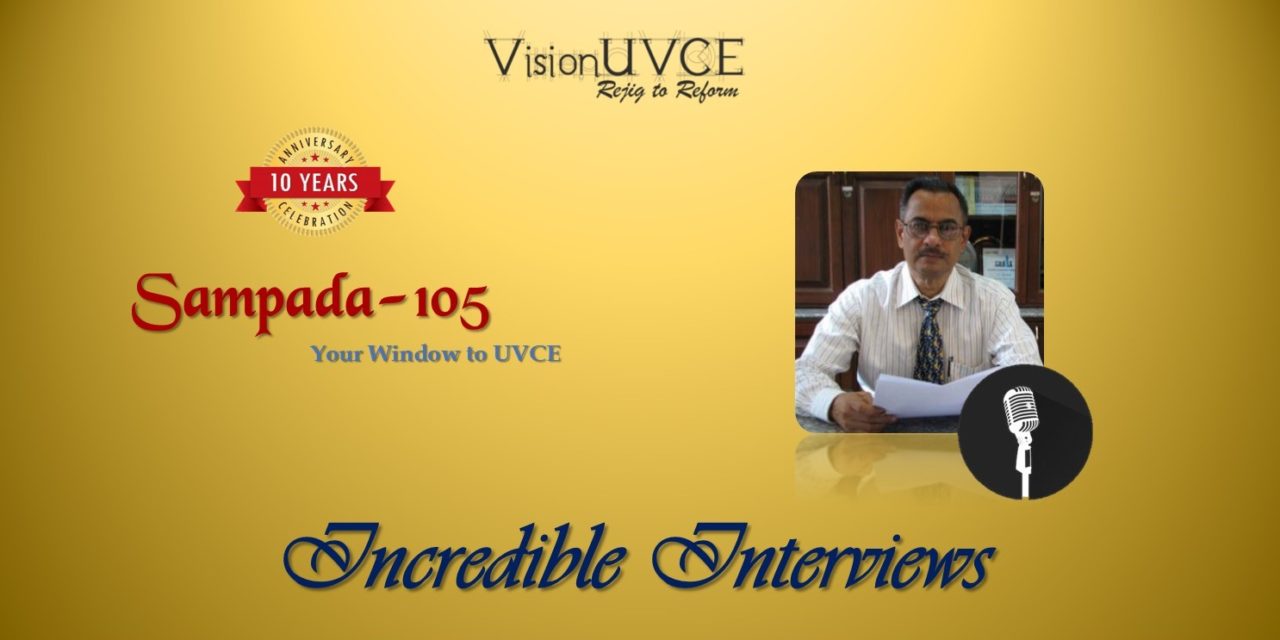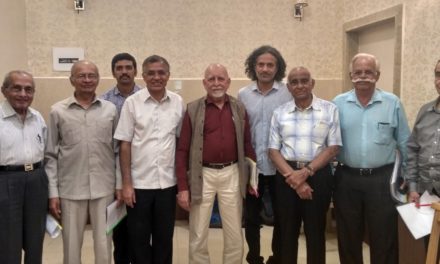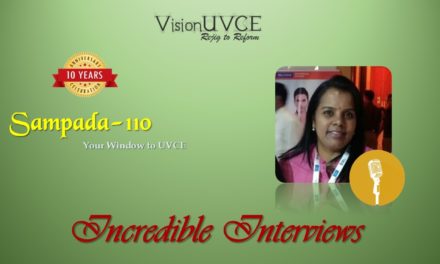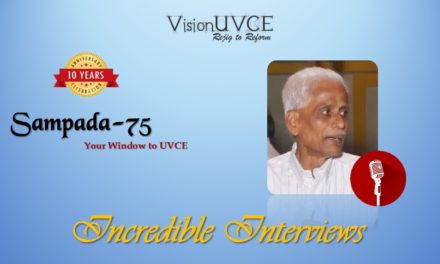Borrowed from SAMPADA old editions – for the 10th Anniversary Special Issue – Interviews section. This one is of Dr M S Suresh, 1971 EEE.
We came in touch with Dr Suresh sir during UVCE Payana. We had visited BNMIT college where we got introduced to him and struck a wonderful conversation. We were glad that he also joined the Panel Discussion during UVCE Payana. That is when we requested him for an interview and we are glad he obliged.
Team Sampada: Please, tell us about yourself Sir.
Dr. Suresh Sir: After graduation in Electrical Engineering from UVCE in 1971, I joined Indian Institute of Science for MTech degree from the Physics department. My first job was at BEL Bangalore for four years, followed by a long stint at ISRO satellite centre for 28 years. I worked on spacecraft power system design during an exciting time when new satellite designs were being made. I acquired a doctorate from Physics department, IISc, while, working at ISRO. In 2006 I decided to shift to academics and now I am with BNMIT, a well known Engineering College for more than a decade having held positions of head of ECE department, Principal and now Dean. I had the privilege of contributing in many areas such as power electronics, electrochemical energy sources, solar cells and sensors. I have guided five PhD students, written two technical books, published 62 technical papers and delivered many technical lectures. I enjoy teaching and experimenting with teaching.
Team SAMPADA: How did you join UVCE and what are your most fond memories of being an UVCEian?
Dr. Suresh Sir: During our time, UVCE and BMS were the only two colleges in Bangalore for merit students. UVCE charged a fee of Rs. 300 per year and was considered the best. My PUC marks were good enough to get me a seat in UVCE, my first choice. The most enjoyable times were the tours during 4th and 5th years and a survey tour to Makalidurga and a project tour to Jog. English classes by Prof. Ramamrutam and Electrical Machine design by Prof. Keshav Rao who, explained through his experience in industry are memorable. The NCC camp, the coupons to go and eat Masala Dosa and sitting in a corner of the library, unnoticed, to read books not allowed for us, walk around majestic are all imprinted in memory. Let me say we enjoyed.
Team SAMPADA: Do you remember organizing or participating in any extracurricular activities back then?
Dr. Suresh Sir: I was not one of those who participated or organized extracurricular activities. I joined the crowd and enjoyed.
Team SAMPADA: Share with us your journey from engineering to being an Academician today.
Dr. Suresh Sir: The journey from a pure industry to research oriented ISRO and working on the cutting edge of technology was exciting. I thought that teaching students through practical experiences would benefit the students and is going to be exciting. This made me take voluntary retirement early and switch to teaching. Now, in teaching for more than a decade, I feel the present system is not conducive to bringing industrial experience to teaching; learning has taken a back seat over memorizing and marks. To mend this, honesty, discipline and systemic changes are needed. Indian industries must be forced to participate, as part of social responsibility and their own benefit in the long run. It is in this context that I would be relevant to academia.
Team SAMPADA: What do you think are the best plans for future of Centenary old UVCE?
Dr. Suresh Sir: Centenary is just a mark on the time scale. Comparing with other government run technical institutions of 100 years, UVCE is nowhere in the vicinity. Today, a bright student would refuse to join UVCE but for other constraints. A change is possible if the clutches of governmental control is removed and is allowed to work like a central technical institute like IIT or at least a NIT. Industrial research, leading to products, is what will improve the status of the college. This must be the long term perspective.
On a short term a group within the college including the principal must be passionate and willing to cooperate with the alumni for bringing in changes. There are alumni in senior positions who can work with the government and help restore the glory. The group within is very crucial because they are the change makers and ultimately the beneficiaries. With he plan and vision, the process will follow.
For a start can the alumni association be revived with a proper election? Can we form an interacting group of alumni, professors and principal? Can the faculty pledge to teach their best and utilize existing facility? The list can go on but is disconcerting. Unless the bull is held by the horn it is difficult to tackle this mammoth problem. It is not impossible!
– Dr M S Suresh, Sampada-105





